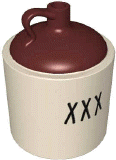Bootlegger Blues
Oct 18, 2004
 There was a time
in America when the term “bootlegger” was very common. It was back in the
20’s and early 30’s when prohibition was the law of the land and the only
booze you could get was either legal by prescription, or illegal, made by
bootleggers. Many a man built a still and produced corn squeezin’s or some
other rotgut that found a ready market in juke joints and nightclubs around the
country. The only real difference, other than quality, was that legal booze had
a federal liquor license and bootleg hootch did not.
There was a time
in America when the term “bootlegger” was very common. It was back in the
20’s and early 30’s when prohibition was the law of the land and the only
booze you could get was either legal by prescription, or illegal, made by
bootleggers. Many a man built a still and produced corn squeezin’s or some
other rotgut that found a ready market in juke joints and nightclubs around the
country. The only real difference, other than quality, was that legal booze had
a federal liquor license and bootleg hootch did not.
It’s interesting
to note that the term “bootlegger,” came originally from the unethical
pioneers who concealed liquor in their boots when they traded with the
Indians, a practice fairly common in
the Midwest in the 1880’s. Later the word became synonymous with
illegal booze manufacture and distribution.
When prohibition made it hard to get legal spirits, it fell
to the bootleggers to supply the goods. So there were hundreds of thousands of
homemade stills, distilling God only knows what into some kind of potable
liquid. The bad stuff was real bad and a lot of folks died from drinking it. The
good stuff is what kept Chicago and other cities going for a few years. It also
financed the rise of the gangs who got rich and powerful supplying the market
with badly wanted goods.
 The Feds had a team of booze cops, who went around fighting
gangs and busting up stills. When prohibition was finally recognized as a bad
mistake and repealed in 1933, their head guy, Harry Anslinger, (a nephew of
Herbert Hoover) who was about to be out of a job, went up on Capitol Hill and
with an impassioned rant convinced congress that his team of still-busters
should not be fired, but be kept on duty to fight a new menace to America’s
youth---marijuana. That’s where all that started.
The Feds had a team of booze cops, who went around fighting
gangs and busting up stills. When prohibition was finally recognized as a bad
mistake and repealed in 1933, their head guy, Harry Anslinger, (a nephew of
Herbert Hoover) who was about to be out of a job, went up on Capitol Hill and
with an impassioned rant convinced congress that his team of still-busters
should not be fired, but be kept on duty to fight a new menace to America’s
youth---marijuana. That’s where all that started.
Even after prohibition was repealed, bootleggers continued
in business for many years. There was still a market for the illegal stuff,
especially in the eight states that retained prohibition for a time. But
eventually, legal distilleries filled the demand, except in a few backwoods
places where bootleggers still ply their trade.
There were numerous blues songs inspired by bootleg booze.
The Mississippi Sheiks recorded “Bootleggers Blues” in 1930, detailing the
trials and tribulations of the whiskey-makers. The Memphis Jug Band recorded
“Rukus Juice And Chittlin’” in 1934. I don’t think ‘Rukus Juice’ had
a tax stamp on it. A 1941 recording by Little Bill Gaither reveals his desire to
make a killing selling “Moonshine By The Keg.” Of course we should keep in
mind that almost all of the beer, wine and hard liquor mentioned in thousands of
early blues and country songs, was of the illegal variety.
 There was a time
in America when the term “bootlegger” was very common. It was back in the
20’s and early 30’s when prohibition was the law of the land and the only
booze you could get was either legal by prescription, or illegal, made by
bootleggers. Many a man built a still and produced corn squeezin’s or some
other rotgut that found a ready market in juke joints and nightclubs around the
country. The only real difference, other than quality, was that legal booze had
a federal liquor license and bootleg hootch did not.
There was a time
in America when the term “bootlegger” was very common. It was back in the
20’s and early 30’s when prohibition was the law of the land and the only
booze you could get was either legal by prescription, or illegal, made by
bootleggers. Many a man built a still and produced corn squeezin’s or some
other rotgut that found a ready market in juke joints and nightclubs around the
country. The only real difference, other than quality, was that legal booze had
a federal liquor license and bootleg hootch did not.